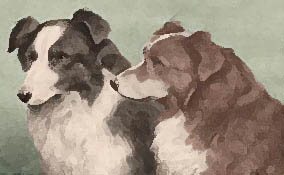

![]()
JAMES HOGG, THE ETTRICK SHEPHERD
PART II: OF SHEPHERD'S DOGS
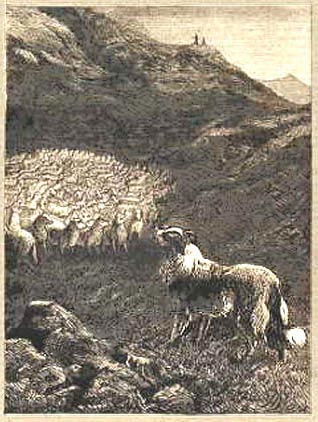
A picture of "James Hogg's Shepherd's Dog"
that appeared with an article on the
occasion of the Hogg centennial. It illustrates the story, below.
Without the shepherd's dog, the whole of the open mountainous land in Scotland would not be worth a sixpence. It would require more hands to manage a stock of sheep, gather them from the hills, force them into houses and folds, and drive them to markets, than the profits of the whole stock were capable of maintaining.--James Hogg, 1824, from The Shepherd's Calendar
Perhaps the best dog that James Hogg owned was Sirrah, a mostly black dog. This story about Sirrah appeared in a letter to Blackwood's Magazine dated February 22, 1818. It very much illustrated how, without a dog, herding sheep in the rugged Scottish countryside, would have been quite impossible.
I was a shepherd for ten years on the same farm, where I had always about 700 lambs put under my charge every year at weaning-time. As they were of the...blackfaced breed, the breaking of them was a very ticklish and difficult task. I was obliged to watch them night and day for the first four days, during which I had always a person to assist me. It happened one year, that just about midnight the lambs broke and came up the moor upon us, making a noise with their running louder than thunder. We got up and waved our plaids, and shouted, in hopes to turn them, but we only made matters worse...and by our exertions we cut them into three divisions.
I called out [to my dog] 'Sirrah, my man, they're away'...but owing to the darkness of the night, and the blackness of the moor, I never saw him at all...I ran here and there, not knowing what to do, but always at intervals, gave a loud whistle to Sirrah, to let him know that I was depending on him...[T]he lad who was assisting me...likewise had lost all traces of the lambs...We both concluded, that whatever way the lambs ran at first, they would finally land at the fold where they left their mothers, and without delay we bent our course towards that; but when we came there, we found nothing of them.
My companion then bent his course towards the farm of Glen on the north, and I ran away westward for several miles, along the wild track where the lambs had grazed while following their dams. We met after it was day, far up a place called the Black Cleuch, but neither of us had been able to discover our lambs, nor any traces of them...We had nothing for it but to return to our master, and inform him that we had lost his whole flock of lambs.
On our way home, however, we discovered a body of lambs at the bottom of a deep ravine, called the Flesh Sleuch, and the indefatigable Sirrah standing in front of them, looking all around for some relief, but still standing true to his charge. The sun was then up; and when we first came in view of them, we concluded that it was one of the divisions of the lambs...But what was our astonishment, when we discovered that not one lamb of the whole flock was wanting! How had he got all the divisions collected in the dark is beyond my comprehension. The charge was left entirely to himself from midnight until the rising of the sun; and if all the shepherds in the Forest had been there to have assisted him, they could not have effected it with greater propriety.
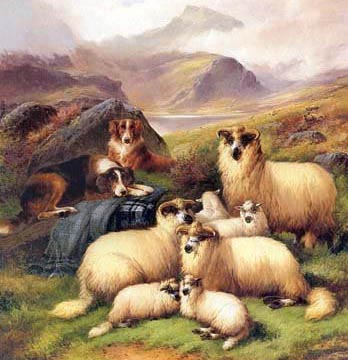 Although James Hogg was not financially successful as a farmer and shepherd,
there is no doubt that he was serious and knowledgeable in those roles. In 1807
he wrote The Shepherd's Guide: being a practical treatise on the diseases of
sheep, published by Archibald Constable and Co., Edinburgh. He knew a great deal
about the working dog's relationship to sheep, and in his Shepherd's Calendar,
among the three things he listed for which "the sheep-fauld [fold] is disquieted"
was "a woughing [barking] dog". There are many stories of sheepdogs at work in
the writing of James Hogg. One, about a "white shaggy colley, named Sparkey, that
belonged to the cow-herd boy", is a classic tale of a dog that that locates sheep
buried in snow:
Although James Hogg was not financially successful as a farmer and shepherd,
there is no doubt that he was serious and knowledgeable in those roles. In 1807
he wrote The Shepherd's Guide: being a practical treatise on the diseases of
sheep, published by Archibald Constable and Co., Edinburgh. He knew a great deal
about the working dog's relationship to sheep, and in his Shepherd's Calendar,
among the three things he listed for which "the sheep-fauld [fold] is disquieted"
was "a woughing [barking] dog". There are many stories of sheepdogs at work in
the writing of James Hogg. One, about a "white shaggy colley, named Sparkey, that
belonged to the cow-herd boy", is a classic tale of a dog that that locates sheep
buried in snow:
There having been 340 of my flock that had never been found at all during the proceeding day, as soon as the morning dawned we set all out to look after them...When we came to the ground where the sheep should have been, there was not one of them above the snow...We went about boring with our long poles, and often did not find one hogg in a quarter of an hour...But at length...Sparkey ...seemed to have comprehended something of our perplexity, for we observed him plying and scraping in the snow with great violence, and always looking over his shoulder to us. On going to the spot, we found that he had marked straight above a sheep. From that he flew to another, and so on to another, as fast as we could dig them out...We got 300 of that division before night...and the greater part of these would have been lost without the voluntary exertions of Sparkey.
Artist unknown; thanks to Beth Maxwell Boyle
More than just being impressed with their intelligence and usefulness, Hogg is delighted by the antics of sheepdogs. His own, and indeed those belonging to other shepherds, more so, perhaps, than we see today, were treated like valued members of the family. In "A Shepherd's Wedding", Hogg describes the scene at the wedding reception: "...The parlour door was, however, thrown open, and, to my astonishment, the first guests who presented themselves were two strong, honest-looking collies, or shepherd's dogs, that came bouncing and capering into the room, with a great deal of seeming satisfaction."
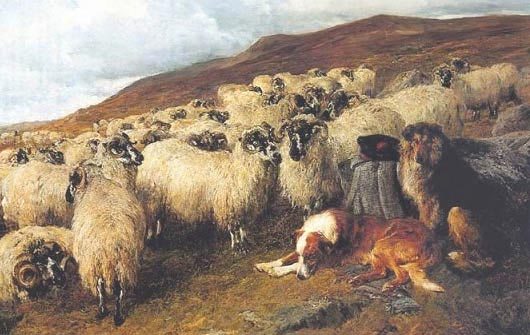 Hogg's dogs lived in the house, and he says of one, Hector, a son of
Sirrah:
Hogg's dogs lived in the house, and he says of one, Hector, a son of
Sirrah:
He had one uniform practice, and a very bad one it was, during the time of family worship, and just three or four seconds before the conclusion of the prayer, he started to his feet, and ran barking round the apartment like a crazed beast. My father was so much amused with this, that he would never suffer me to correct him for it. [Hector's] great daily occupation was pointing the cat" which "he had a mortal antipathy to". He also "inherited his dad's unfortunate ear for music", and, when Hogg was precentor in church, "the moment that he heard my voice strike up the psalm...then did he fall in with such overpowering vehemence, that he and I seldom got any to join in the music but out two selves.
Hector was the dog that seems to have won Hogg's heart. In his Shepherd's Calendar, Hogg says of Hector that "though not nearly so valuable a dog as his father, he was a far more interesting one". Most of the stories about Hector are amusing ones, but Hogg also tells us how he worked:
Hector was quite incapable of performing the same feats among sheep that his father did; but as far as his judgement served him, he was a docile and obliging creature. He had one singular quality, of keeping true to the charge to which he was set. If we had been shearing, or sorting sheep in any way, when a division was turned out, and Hector got the word to attend to them, he would have done it pleasantly, for a whole day, without the least symptom of weariness. No noise or hurry about the fold, which brings every dog from his business, had the least effect on Hector, save that it made him a little troublesome on his own charge, and set him a running round and round them, turning them in at corners, out of a sort of impatience to be employed as well as his baying neighbours at the fold.
Hogg says he "had a great attachment to this animal, who, with a good deal of absurdity, joined all the amiable qualities of his species. He was rather of a small size, very rough and shagged, and"-you may be as surprised as I-"not far from the colour of a fox." Hector was a red dog! Though he claimed Hector's "reasoning faculty to be laughably obtuse", it was to Hector that Hogg wrote the following long, emotional address presented here:
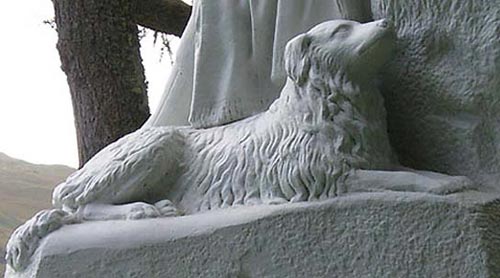
Above, the portrait of Hogg's sheepdog, Hector,
on the Hogg statue by Currie at St. Mary's Loch, in the Borders of Scotland.
(Photo by Carole or David Presberg, October, 2006.)
"The Author's Address to his Auld Dog Hector"
by James Hogg
(from The
Mountain Bard, 1807)
Come, my auld, towzy trusty friend; old shaggy waur gaurs ye look sae douth an' wae? what makes you D'ye think my favour's at an end, /look so sad and woeful Because thy head is turnin' grey? Although thy feet begin to fail, Their best were spent in serving me; An' can I grudge thy wee bit meal, small some comfort in thy age to gi'e? give For mony a day, frae sun to sun, many We've toil'd an helpit ane anither; one another An' mony a thousand mile thou'st run, To keep my thraward flocks thegither. perverse...together To nae thrawn boy, nor scawghin' wife, perverse...scolding Shall thy auld banes become a drudge; old bones At cats an' callans, a' thy life, young boys Thou ever bore a mortal grudge. An' whiles thy surly looks declared, Thou lo'ed the women warst of a'; worst of all 'Cause aft they my affection shared, often Which thou couldst never bruik ata'. brook at all When sitting with my bonny Meg, Mair happy than a prince could be, more Thou plac'd thee by her other leg, An' watched her wi' a jealous ee. eye An' then, at ony start or steer, any...stir Thou wad ha'e worried furiouslye; would have snarled While I was forc'd to curse and swear, Afore thou wad forbidden be, Yet wad she clasp thy towzy paw; would...shaggy Thy greesome grips were never skaithly; trembling...hurtful An' thou than her hast been mair true! to...more An' truer than the friend that ga'e thee! gave Ah, me! of fashion, health, an' pride, The world has read me sic a lecture! such But yet it's a' in part repaid By thee, my faithful, grateful Hector! O'er past imprudence, oft alane alone I've shed the saut an' silent tear; salt Then, sharing ay my grief an' pain, always My poor auld friend came snoovin' near sneaking For a' the days we've sojourned here, An' they've been neither fine nor few, That thought possest thee year to year, That a' my griefs arase frae you. arose from Wi'waesome face, and hingin' head, woesome...hanging Thou wad ha'e press'd thee to my knee; would have While I thy looks as weel could read, well As thou hadst said in words to me,-- 'O my dear master, dinna greet; don't lament What ha'e I ever done to vex ye? have See here I'm cowrin' at your feet; cowering Just take my life if I perplex ye. For a' my toil, my wee drap meat little bit of Is a' the wage I ask of thee; For whilk I'm oft oblig'd to wait Wi' hungry wame, an' patient ee. belly...eye Whatever wayward course ye steer; Whatever sad mischance o'ertake ye; Man, here is ane will hald ye dear! one...hold Man, here's a friend will ne'er forsake ye!' Yes, my puir beast! though friends me scorn poor Whom mair than life I valued dear; more An' throw me out to fight forlorn, Wi' ills my heart dow hardly bear, can While I have thee to bear a part-- My plaid, my health, an' heezle rung-- hazel staff I'll scorn the silly haughty heart, The saucy look, and slanderous tongue. Sure friends by pop'lar envy sway'd, Are ten times waur than ony fae! worse...any foe My heart was theirs, an' to them laid As open as the light o' day. I fear'd my ain; but never dredd own...fear That I for loss o' theirs should mourn; Or that, when luck or favour fled, Their friendship was injurious turn. But He, who feeds the ravens young, Let naething pass unheeded bye; He'll sometimes judge of right an' wrong, An' ay provide for you and I. always And hear me, Hector: thee I'll trust, As far as thou hast wit anŐ skill; Sae will I ae sweet lovely breast, always To me a balm for every ill. To these my faith shall ever run, While I have reason truth to scan; see But ne'er, beyond my mother's son, To aught that bears the shape of man.-- I ne'er could thole thy cravin' face, bear...begging Nor when ye pattit on my knee; put it Though in a far an' unco place, strange I've whiles been forc'd to beg for thee. sometimes Even now I'm in my master's power, Where my regard may scarce be shown; But ere I'm forced to gi'e thee o'er, give you up When thou art auld an' useless grown. I'll get a cottage o' my ain, of my own Some wee bit cannie, lonely biel', little frugal...shelter Where thy auld heart shall rest fu' fain, full fondly An' share with me my humble meal. Thy post shall be to guard the door, An' bark at pethers, boys, an' whips; pedlars...horse traders Of cats an' hens to clear the floor, An' bite the flaes that vex thy hips. fleas When my last bannock's on the hearth, bread Of that thou sanna want thy share; shall not While I have house or hald on earth, hold My Hector, shall ha'e shelter there. An' should grim death thy noddle save, head Till he has made an end of me; Ye'll lye a wee while on the grave Of ane wha ay was kind to thee. one who always There's nane alive will miss me mair; none...more An' though in words thou canst not wail, On a' the claes thy master ware, clothes...wore Thou'lt smell, and fawn, an' wag thy tail. An' if I'm forc'd with thee to part, Which will be sair against my will, sore I'll sometimes mind thy honest heart, As lang as I can climb a hill. long Come my auld, touzy trusty tike, old shaggy...cur Let's speel to Queensb'ry's lofty brow; climb There greedy midges never fike; worry There care an' envy never grow. While gazing down the fertile dales, Content an' peace shall ay be by; always be near An' muses leave their native vales. To rove at large wi' you and I.
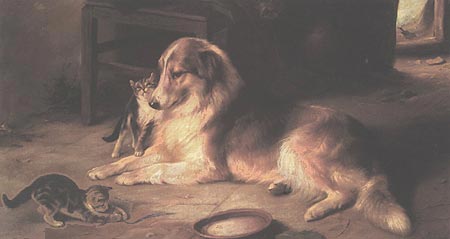
"Good Friends" by Walter Hunt
Please go to James Hogg, the Ettrick Shepherd,
Part III: A Tribute to Hogg a Century After
His Death
Back to James Hogg, the Ettrick Shepherd,
Part I, Shepherd and Farmer
Back to Introduction to James Hogg.
Back to

the Border Collie Museum
THE OTHER WEB PAGES WE MAINTAIN
These web pages are copyright ©2013
and maintained by webmeistress Carole Presberg
with technical help from webwizard David Presberg
ALL RIGHTS RESERVED
If you are interested in using ANY material on this website, you MUST first ask for permission.